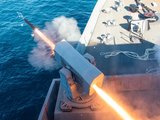Raytheon systems in DDG 1000 trials
Systems supplied by Raytheon have performed successfully during Alpha Trials of the US Navy's DDG 1000 Zumwalt-class destroyer vessel, the company announced on 10 February.
Raytheon is providing electronic and combat systems for the three ships of the class.
The week-long trials demonstrated key ship capabilities, including the Total Ship Computing Environment (TSCE) and engineering control systems. TSCE provides all shipboard computing applications, including the embedded training; damage control and support system; ship and machinery control systems; C4I elements; and combat management systems.
Paul Ferraro, vice president, seapower capability systems business, integrated defence systems, Raytheon, said: ‘It was a privilege to see the first of these revolutionary ships set sail. The sea trials represent the culmination of years of design, development and production, systems and shipboard integration, testing and training.
‘We share in the collective pride of the government-industry team, knowing what an outstanding contribution we're making to the navy and the nation.’
More from Digital Battlespace
-
![World Defense Show 2026: Northrop Grumman to present improved C2 management system]()
World Defense Show 2026: Northrop Grumman to present improved C2 management system
The Northrop Grumman Integrated Battle Command System is in service with Poland and the US Army with another 20 countries believed to have expressed an interest.
-
![Thales looks to boost DigitalCrew system through AI and human-machine teaming trials]()
Thales looks to boost DigitalCrew system through AI and human-machine teaming trials
The Thales DigitalCrew package, first unveiled at last year’s Defence IQ International Armoured Vehicles conference, is designed to merge imaging and apply a layer of decision-making and observation algorithms to support crew and other personnel.
-
![Babcock nears first customer for Nomad AI translation tool]()
Babcock nears first customer for Nomad AI translation tool
Nomad can provide militaries with real-time intelligence, saving critical time on the battlefield.
-
![AUSA 2025: Israel’s Asio Technologies to supply hundreds of improved Taurus tactical systems]()
AUSA 2025: Israel’s Asio Technologies to supply hundreds of improved Taurus tactical systems
Taurus operates alongside the Israel Defense Forces’ Orion system which supports mission management across tens of thousands of manoeuvring forces, from squad leaders to battalion commanders.
-
![AUSA 2025: Kopin pushes micro-LED plans as China moves faster]()
AUSA 2025: Kopin pushes micro-LED plans as China moves faster
The plan for the new displays follows fresh investment in Kopin’s European facilities by Theon and an order for head-up displays in fielded aircraft, with funding from the US Department of Defense.
-
![AUSA 2025: Persistent Systems to complete its largest order by year’s end]()
AUSA 2025: Persistent Systems to complete its largest order by year’s end
Persistent Systems received its largest ever single order for its MPU5 devices and other systems earlier this month and has already delivered the 50 units to the US Army’s 4th Infantry Division.


























